Former AG Terrirudin is back in the picture with the 'addendum' issue - and we note there are still UNANSWERED questions about his 'removal' as Attorney General because of 'retirement'(odd-too young to retire)...and, if REMOVED, then should it not be in accordance to the provisions in the Federal Constitution...Can a AG be removed by the Prime Minister by advising the King to appoint him judge.
Did Chief Justice[Tun Tengku Maimun Tuan Mat], the President of the Court of
Appeal and the Chief Judges of the two High Courts agree and RECOMMEND a sitting Attorney General/Public Prosecutor to become Judge- The HEADS OF THE JUDICIARY MUST CLARIFY - for it is very wrong, if they RECOMMENDED Terrirudin to be a Federal Court Judge. If AFTER he had retired or ceased to be AG, the JAC recommended - then NO issue. But, he was AG the day before he was made a Federal Court Judge - and thus JAC must have recommended way before when he was still the Attorney General... and that is wrong.
Like Judges, the Attorney General(Public Prosecutor) must be INDEPENDENT, and that is WHY even the Constitution makes provisions how the PM/Government can remove an AG/PP - just like removing a Federal Court Judge.... If the Attorney General at the point of appointment not stated clearly that it was for a stated FIXED TERM, then it must be until RETIREMENT - be it 60 or 66.
Did the Judicial Appointments Commission(JAC) recommend that the sitting Attorney General/Public Prosecutor be appointed as a Federal Court Judge?
What is worrying is that the JAC is also made up of the Chief Justice[Tun Tengku Maimun Tuan Mat], the President of the Court of Appeal, the Chief Judges of the two High Courts, and members appointed by the Prime Minister namely one Federal Court Judge and four eminent persons? So, did the Chief Justice, the President of the Court of Appeal and the Chief Judges of the two High Courts also recommend then sitting Attorney General/Public Prosecutor Ahmad Terrirudin Salleh to be appointed Federal Court Judge?
By the said appointment of Terrirudin to become a Federal Court Judge, it was a CREATIVE removal of a sitting AG/Public Prosecutor, which in my opinion was very WRONG.
And, if the heads of the Malaysian Judiciary also recommended that a sitting AG/PP be a Federal Court Judge - we have to be most concerned with the current State of the Malaysian Judiciary.
Was Terrirudin REMOVED as Attorney General/Public Prosecutor?
# He was 54/56 years old - not yet retirement age of 60, or 66 being the retirement age of Judges.
# When he was appointed AG, there was no indication that he was being appointed for a fix term of 2 years, 1 years or 6 month? If there was no 'fixed term', naturally the end of tenure will be on the day of RETIREMENT...- unless removed earlier according to the provision of the Constitution.
# Terrirudin was appointed on 6/9/2023, and after about 1 year and 2 months on 11/11/2024, he was removed as Attorney General. Usually a fixed-contract would be 1 year, 6 months, etc... and it will be stated at the time of appointment. In the case of Terrirudin, there seem to be no indication of the Length of his TERM as AG - thus it can only be taken as the day of RETIREMENT - unless removed earlier according to the provision of the Constitution.
His predecessor, Idrus was appointed as the A-G for a two-year term under the administration of the then prime minister Tan Sri Muhyiddin Yassin. His tenure was then extended for another year under the administration of Datuk Seri Ismail Sabri Yaakob. His contract as the A-G was again extended for another six months from March 6 this year under Datuk Seri Anwar Ibrahim's administration.- NST, 1/9/2023
# Prior to his removal, there was media reports about 'RETIREMENT', when he was far from retirement age...Was it because there was NO fixed term when appointed? Was it to 'camouflage' a removal of a Attorney General into making us all believe that he was 'retiring'?
DID PM ANWAR IBRAHIM WHO DECIDES ON WHO WILL BE THE ATTORNEY GENERAL just get rid of the sitting AG creatively before the end of his tenure - and immediately the day after, he was appointed Federal Court Judge?
Can the appointment of a sitting AG as a Judge be an OK way to get rid a sitting AG - after all, the PM has the power - the King will appoint whoever the PM advises to appoint as AG or Judge - is this something we must CHANGE, as we certainly do not want any PM to be able to decide on AG, change AGs anytime by just getting the King to appoint them to some other position....
ANWAR IBRAHIM should never have advised the King to appoint the then Attorney General to become a FEDERAL COURT JUDGE. {Was it not a 'demotion'?}
To remove an ATTORNEY GENERAL, the Federal Constitution provides how it is to be done...and it is not easy.
An Attorney General '...shall not be removed from office except on the like grounds and in the like manner as a judge of the Federal Court.
So, how do we remove a Judge - well, Art. 125 deals with this
(3) If the Prime Minister, or the Chief Justice after consulting the Prime Minister, represents to the Yang di-Pertuan Agong that a judge of the Federal Court ought to be removed on the ground of any breach of any provision of the code of ethics prescribed under Clause (3B) or on the ground of inability, from infirmity of body or mind or any other cause, properly to discharge the functions of his office, the Yang di- Pertuan Agong shall appoint a tribunal in accordance with Clause (4) and refer the representation to it; and may on the recommendation of the tribunal remove the judge from office.
(3A) Where a judge has committed a breach of any provisions of the code of ethics prescribed under Clause (3B) but the Chief Justice is of the opinion that the breach does not warrant the judge being referred to a tribunal appointed under Clause (4), the Chief Justice may refer the judge to a body constituted under federal law to deal with such breach.
(3B) The Yang di-Pertuan Agong on the recommendation of the Chief Justice, the President of the Court of Appeal and the Chief Judges of the High Courts may, after consulting the Prime Minister, prescribe in writing a code of ethics which shall also include provisions on the procedure to be followed and sanctions which can be imposed other than the removal of a judge from office under Clause (3), in relation to a breach of any provision of the code of ethics.
(3C) The code of ethics prescribed under Clause (3B) shall be observed by every judge of the Federal Court and every judicial commissioner.
(4) The tribunal appointed under Clause (3) shall consist of not less than five persons who hold or have held office as judge of the Federal Court, the Court of Appeal or a High Court, or, if it appears to the Yang di-Pertuan Agong expedient to make such appointment, persons who hold or have held equivalent office in any other part of the Commonwealth, and shall be presided over by the member first in the following order, namely, the Chief Justice of the Federal Court, the President and the Chief Judges according to their precedence among themselves, and other members according to the order of their appointment to an office qualifying them for membership (the older coming before the younger of two members with appointments of the same date).
(5) Pending any reference and report under Clause (3) the Yang di-Pertuan Agong may on the recommendation of the Prime Minister and, in the case of any other judge after consulting the Chief Justice, suspend a judge of the Federal Court from the exercise of his functions.
Tun Tengku Maimun Tuan Mat in her recent speech talked about the Judicial Appointment Commission - but sadly, it did not specifically state that our current Prime Minister Anwar Ibrahim without fail followed the recommendation of the JAC with regards to appointments and elevations of Judges... or did Anwar Ibrahim IGNORE the recommendations and chose his own JUDGES...
Judicial appointments
The second and final aspect of my focus is the topic of judicial appointments. This topic is of paramount importance for the following reasons.
Firstly, the very building blocks of the judicial institution are its Judges. A Judge must not only be qualified on paper but must carry with him or her the right temperament, physical stamina and the mental courage to deal with the high demands of the duties of their office. If the wrong persons are appointed, the very course of justice stands to be averted. It is almost impossible to build a resolute and entirely independent institution if its lead actors are not poised to play the part required of them.
Secondly, we cannot deny the blemish in our history — that was the 1988 Judicial Crisis. This one crisis itself tarnished the independence of the Judiciary and paved the way for further incursions into the Institution. In its aftermath, we also witnessed completely unsettling events that are known as the infamous VK Lingam Tapes. Most heinously, revelations were made that certain persons were literally deciding on who should become Judges specifically as a means of reward, as though appointments of judges can be used as bargaining chips. This event called for an independent judicial appointments process to ensure that tarnished candidates do not stand a chance of appointment.
Prior to 2009, the judicial process was rather simplistic in the sense that it was only based on a few provisions of the Constitution. Without getting too technical, when it comes to the appointment of ordinary Superior Court Judges, the Prime Minister tenders his advice to the Yang di-Pertuan Agong (‘YDPA’) upon consulting the Chief Justice and after conferring with the Conference of Rulers.
This process underwent a radical shift in 2009 with the introduction of the Judicial Appointments Commission Act 2009 [Act 695] (‘JACA 2009’) which established the Judicial Appointments Commission or as it is more commonly referred to: ‘JAC’.
What I am about to share with you next are not my personal views but actual discussions that took place in the Dewan Rakyat regarding the passing of the JACA 2009.
The need for the JACA 2009 were grounded on many allegations and attacks against the Government. Pertinently, many members of the opposition appeared to express the sentiment that the introduction of the Bill to the JACA 2009 was merely a cover up for all the past appointments that had been made. I invite each and every one of you to scrutinise the Hansard for 16.12.2008 and 17.12.2008.
Most of all, I find relevant the views of the then recently appointed Leader of the Opposition and current Prime Minister of Malaysia, Dato’ Seri Anwar bin Ibrahim who expressed strong views on the VK Lingam incident. Dato’ Seri Anwar Ibrahim concluded then that the JACA 2009 (in his view) was not enough to restore the independence of the Judiciary. He went on to observe that there is a perception that persons who had decided in favour of the Government were promoted.
Dato’ Seri Anwar Ibrahim’s observation then, relates directly to the fundamental aspect of judicial independence, in that perception plays a big part in it. The public cannot be expected to have confidence in the judicial institution no matter how hard its Judges work if the pervading public perception is that Judges are appointed or elevated upon the favour of making decisions that by default support the Government or certain business interests.
When things like this happen, it is very similar to if not worse than the lessons in the children’s parable of the boy who cried wolf. Cry wolf wantonly could backfire when no one believes you when the wolf actually arrives to eat the sheep. Applying it to us, making the irredeemable mistake of rendering one decision coloured with bias, or appointing one candidate that is only chosen as a favour, throws into question the integrity of the entire Judiciary and none of the decisions delivered after that will engender the public confidence and trust, even if that decision is absolutely correct on the facts and the law.
It takes decades to instil a steady level of trust and confidence in the Judiciary. Judges work hard with considerable commitment towards this end. And since 2016 until now, that goal has largely been realised. Malaysia has improved on all major Rule of Law and judicial independence indices. In 2023, Malaysia ranked 55th out of 142 countries worldwide in our Rule of Law ranking, being among the minority of countries whose rankings improved in that year — a significant 23 place improvement from 2016. It is important to acknowledge that these are not merely statistics or empty figures. They denote the reality of how the country is viewed for purposes of investment, and are requisites for economic and social progress. The best evidence of this is the research of the 2024 Nobel Prize Winners for Economics whose research can briefly be summarised as empirically demonstrating the importance of strong institutions, a key one being the Judiciary, in fostering long term and sustainable economic growth. To maintain this reputation, it is imperative that judicial independence which is central to the Rule of Law, be upheld and enhanced.
From 1988, it is only now that we are on the road to recovery in terms of our perception of independence. Incidentally, 15 years ago, before the JACA 2009 was enforced, the then leader of the Opposition made the comments that he did, as reflected in the Hansard, on the appointment of Judges and judicial independence. I am certain that now, as Prime Minister, Dato’ Seri Anwar Ibrahim and his Government will remain true to those comments by continuing to unreservedly remain committed to upholding the cause of judicial independence.
In spite of the many criticisms levelled against the JACA 2009 in the debates prior to its passing, the JACA remains in force. The purpose of the Act, as was clarified by the then Government when moving the Bill, was not to change the constitutional mechanisms of appointment of Judges, but to further streamline and enhance the selection of candidates for judicial appointment.
Viewed in this way, the provisions of the JACA 2009 and the establishment of the JAC is seen as a measure to supplement and complement the constitutional provisions on the appointment of Judges of the Superior Courts.
The JACA 2009 statutorily prescribed selection criteria for potential candidates for judicial appointments. These criteria are evaluated by JAC members who ex-officio comprise the Chief Justice, the President of the Court of Appeal, the Chief Judges of the two High Courts, and members appointed by the Prime Minister namely one Federal Court Judge and four eminent persons.
Typically, these four eminent persons are appointed from among the academia or from the pool of retired Judges. These four eminent persons cannot be members of the executive or other public service and are appointed by the Prime Minister after consulting the Bar Council of Malaysia, the Sabah Law Society, the Advocates Association of Sarawak, the Attorney General of the Federation and the Attorney General of a State legal service.
Aspiring candidates apply to the JAC for appointment as Judicial Commissioners. The JAC also reviews the performance of sitting Superior Court Judges and recommends them for elevation or promotion. These decisions have always been made by a majority vote through a secret ballot (if there is no consensus) and in all my time as a member of the JAC, I have not once interfered with the process. The candidate who gets recommended is therefore not the sole choice of the Chief Justice but either the choice of the majority or the collective decision of the JAC. In my opinion, this is a big improvement from what we did not have before.
Any person who interferes with or attempts to interfere with the independent functions of the JAC commits an offence and shall on conviction be liable to a fine not exceeding RM100,000, imprisonment for not more than two years, or to both.
Candidates that are selected are forwarded to the Prime Minister to appoint in accordance with the provisions of the Constitution. The provisions of the JACA 2009 do however, allow the Prime Minister to not accept the candidates recommended by the JAC for appointments. In such cases, the Prime Minister can request for two more names of candidates.
The mechanism of the JACA 2009 is far from perfect. As we can see from the Parliamentary debates, there are many issues raised against it. Even after its passing, many quarters, including the Bar Council have recommended changes to strengthen the Act. Foremost, concerns the fact that the Prime Minister still has too much power in the appointment of Judges.
I do not wish to address the recommendations at this point. I am highlighting this to simply bring it back to the attention of the parties present here for possible improvements in the near future.
That said, what is clear from the constitutional provisions on the appointment of Judges read with the supplementing procedure in the JACA 2009 is this — no person other than the JAC and the Prime Minister can recommend candidates for appointment to all posts in the Superior Courts.
Any form of circumvention of these provisions could render those appointments either unconstitutional or in breach of written law. For this reason, no person, whether it be the President of the Malaysian Bar, any advocate or solicitor, any political party, the Attorney General or any other person for that matter has any business recommending names to the Prime Minister for appointment.
For if this is done, not only has the Judiciary been trampled upon; its independence been transgressed and eroded; it is an attempt to interfere with the course of justice by influencing the operations of the Judiciary. And any name so considered on such improper advice runs the risk of being challenged via judicial review as being either unconstitutional or in breach of the law. Any person so found to have done this also runs the risk of being charged with an offence.
I have been an ardent and firm believer in the independence of the Judiciary including the appointment of its Judges. Hence, I have steadfastly observed all the principles espoused in the Constitution and the JACA 2009. If anyone has any reason to believe that we have not done this, then I would remind you that, as the law and procedure stand, the JAC again is only but one part of the appointments process and you should perhaps point the finger elsewhere.
As I near the end of my tenure, it is my sincere hope that those responsible for the appointment of Judges remember their commitments to their oaths and duties under the Constitution and law, and continue to hold true to past comments or commitments that they may have made regarding the fair, independent and unadulterated appointment of Judges. - Edge Malaysia, 8/1/2025
Was recent appointment of judges LEGAL? Was the JAC and/or Heads of Judiciary involved in premature removal of AG/PP? When will Anwar 'OBEY' Conference of Rulers?
DID PM Anwar Ibrahim appoint Judges as per the advice of the JAC? Or did he advice the King to appoint persons he chose to be JUDGES, ignoring the recommendation of the JAC?
Did Chief Justice Tun Tengku Maimun Tuan Mat recommend Ahmad Terrirudin(then Attorney General) to be appointed Federal Court Judge? WHY?
Why has PM Anwar still to act on the Conference of Rulers statement, that the PM should NOT be involved in the appointment of persons in the Judicial Appointments Commission - now, 5 out of the 9 members of the JAC are persons appointed by King as advised by PM...
The worry is that the Prime Minister may be appointing 'his people' as Judges...and there are cases in our courts where the Anwar Ibrahim is a party...
Ahmad Terrirudin Salleh appointed new AG
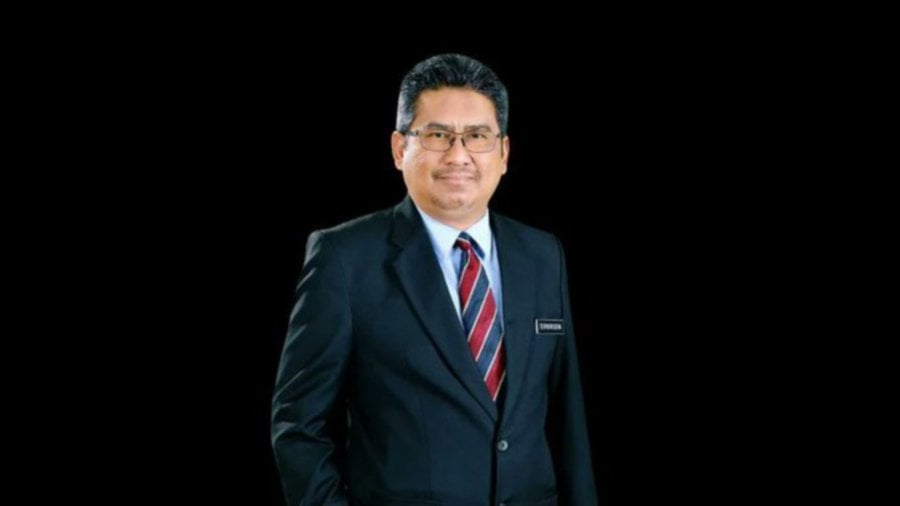
KUALA LUMPUR: Solicitor-General Datuk Ahmad Terrirudin Mohd Salleh has been appointed as the new Attorney-General, effective Sept 6.
He replaces Tan Sri Idrus Harun.
A law graduate from Universiti Malaya, Terrirudin joined the judicial and legal service in 1995 where he had served several postings such as senior assistant registrar of the High Court of Malaya, magistrate in Sibu, sessions court judge in Kuala Lumpur, and special officer to the chief justice of the Federal Court.
He then assumed the position of the Federal Court chief registrar on May 3, 2019.
Prior to his appointment as the A-G, he was appointed as the Solicitor-General on March 25, 2022.
Earlier today, the Chief Secretary to the Government Tan Sri Mohd Zuki Ali in a statement said that Terrirudin would replace Tan Sri Idrus Harun whose contract would end on Sept 5.
"In accordance with Clause (1) of Article 145 of the Federal Constitution, His Majesty the Yang di-Pertuan Agong also approved the appointment of Ahmad Terrirudin as the new Attorney-General."
His predecessor, Idrus was appointed as the A-G for a two-year term under the administration of the then prime minister Tan Sri Muhyiddin Yassin.
His tenure was then extended for another year under the administration of Datuk Seri Ismail Sabri Yaakob.
His contract as the A-G was again extended for another six months from March 6 this year under Datuk Seri Anwar Ibrahim's administration.
Idrus' retirement came on the heels of issues relating to court cases of high profile politicians and document leaks.
Among them are the issues of the decision to drop Datuk Raja Rozela Raja Toran as the lead prosecutor in Deputy Prime Minister Datuk Seri Dr Ahmad Zahid Hamidi's corruption case, where Idrus had defended the decision, saying that it was done to ensure continuity.
The senior prosecutor had been the lead deputy public prosecutor (DPP) in the case where the Deputy Prime Minister is accused of misappropriating RM31 million from the charity foundation Yayasan Akal Budi (YAB).
There was also the issue of a leaked memorandum relating to the grounds of the Attorney-General's Chambers' (A-GC) decision on former prime minister Datuk Seri Najib Razak's final appeal against his conviction in the SRC International corruption case.
The alleged 12-page memo which was circulated online, stated that an evaluation found on the available evidence in the case involving Najib and former Treasury secretary-general Tan Sri Irwan Serigar Abdullah was deemed to be "grossly insufficient" to prove a prima facie case for the six charges.
The memo was purportedly sent by the lead prosecutor in the case, Datuk Jamil Aripin, to Tan Sri Tommy Thomas, who was the attorney-general at the time. - NST, 1/9/2023

Federal Court judge Datuk Seri Hasnah Mohammed Hashim has been appointed the new Chief Judge of Malaya. (Photos by Patrick Goh/The Edge)
PUTRAJAYA (Nov 12): Federal Court judge Datuk Seri Hasnah Mohammed Hashim has been appointed the new Chief Judge of Malaya (CJM), the third-highest position in the judicial hierarchy, confirming a report by The Edge on Monday about her new appointment.
Hasnah, 65, is Malaysia's third female CJM after Tan Sri Siti Norma Yaakob (2005) and Tan Sri Zaharah Ibrahim (2018). The post has been left vacant for about nine months now, after the previous CJM, Tan Sri Mohamad Zabidin Mohd Diah, who was appointed to the post on Jan 17, 2023, went on mandatory retirement on Feb 29, 2024.
Hasnah was sworn in at the Palace of Justice here on Tuesday, together with former attorney general Tan Sri Ahmad Terrirudin Mohd Salleh, who was appointed as a Federal Court judge.
One-year tenure
Hasnah is currently the third in terms of seniority at the Federal Court, after judges Tan Sri Nallini Pathmanathan and Datuk Zabariah Mohd Yusof.
She joined the judiciary as a judicial commissioner in 2010, before being elevated to High Court judge on April 4, 2012, and then further to Court of Appeal judge on March 21, 2016. She was then appointed a Federal Court judge on Dec 5, 2019.
Hasnah, however, may only be able to hold the position for one year, as judges face compulsory retirement at the age of 66, and their tenure can only be extended for another six months, as stipulated under Article 125(1) of the Federal Constitution.
Ahmad Terriruddin, meanwhile, was the sole appointee to the Federal Court. His appointment came a day after he left the AG post, which he was appointed to in September last year. Prior to his time as AG, Ahmad Terrirudin served as the solicitor general.
Also sworn in were eight High Court judges who were appointed as Court of Appeal judges, while 16 others were made High Court judges.
The eight new COA judges are Datuk Noorin Badaruddin, Datuk Seri Mohd Firuz Jaffril, Datuk Dr Alwi Abdul Wahab, Datuk Faizah Jamaludin, Datuk Ahmad Kamal Md Shahid, Datuk Ismail Brahim, Datuk Wan Ahmad Farid Wan Salleh, and Datuk Ahmad Fairuz Zainol Abidin.
The 16 new High Court judges are: Azizan Md Arshad, Narkunavathy Sundareson, Noor Ruwena Md Nurdin, Jamhirah Ali, Noor Hayati Mat, Azlan Sulaiman, Kenneth Yong Ken Chinson St James, Leong Wai Hong, Noor Hisham Ismail, Roz Mawar Rozain, Wan Fadhilah Nor Wan Idris, Rofiah Mohamad, Wong Mee Ling, Datuk Raja Ahmad Mokhzanuddin Shah Raja Mohzan, Suria Kumar DJ Paul, and Fathiyah Idris. All 16 were elevated from Judicial Commissioner to the title of High Court judge.
Prior to the swearing in ceremony, all the judges received their instruments of appointment from the Yang di-Pertuan Agong at Istana Negara in the morning.
All
appointees took their oaths before Chief Justice Tun Tengku Maimun Tuan
Mat, Court of Appeal president Tan Sri Amar Abang Iskandar Abang Hashim,
and Chief Judge of Sabah and Sarawak Datuk Abdul Rahman Sebli. - Edge, 12/11/2024
The then Kuala Lumpur High Court judge Datuk Collin Lawrence Sequerah (who has since been elevated to be an appellate court judge) upheld the prosecution’s application for a discharge not amounting to acquittal (DNAA) for Zahid as opposed to the defence’s request for a full acquittal.
Yesterday (Nov 11), Chief Secretary to the Government Tan Sri Shamsul Azri Abu Bakar said the Yang di-Pertuan Agong has consented to the appointment of the AGC’s trial and appellate division head Datuk Mohd Dusuki Mokhtar as Terrirudin’s successor in accordance with Article 145(1) of the Federal Constitution.
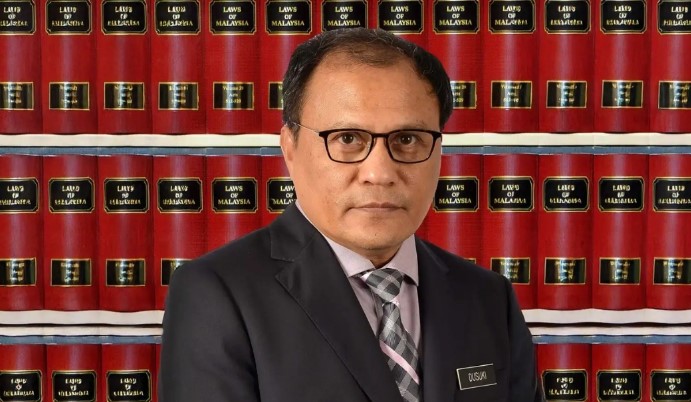
“The government expresses its sincere gratitude to Terrirudin for his service to the nation during his tenure as AG” he said in a statement.
In Hector’s contention, Terrirudin who was appointed as the AG on Sept 6 last year to succeed Tan Sri Idrus Harun whose contractual appointment ended a day earlier should not be removed before his retirement age of 60.
“The question is WHY was Terrirudin removed by the PM?” he asserted. “The AG is appointed on the advice of the PM as Article 145(1) states that the Yang di-Pertuan Agong shall on the advice of the PM appoint a person who is qualified to be a judge of the Federal Court to be the AG for the Federation.”
In his earlier blog in July when news first broke out that the Judicial Appointments Commission (JAC) had recommended Alor Setar-born Terrirudin to be appointed a Federal Court judge, Hector has raised the question if “the PM is ignoring the recommendation of JAC and forwarding his own name to the Conference of Rulers?” – Nov 12, 2024
Main image credit: Utusan Malaysia - Focus, 12/11/2024



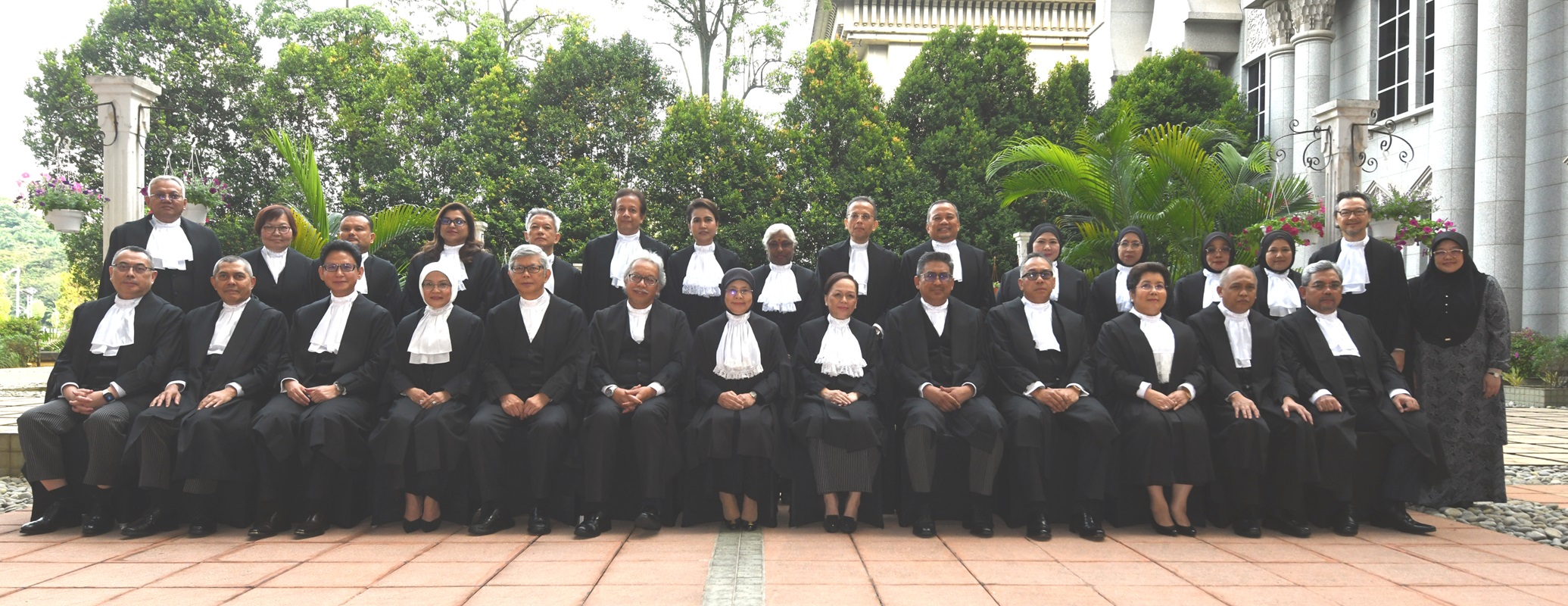
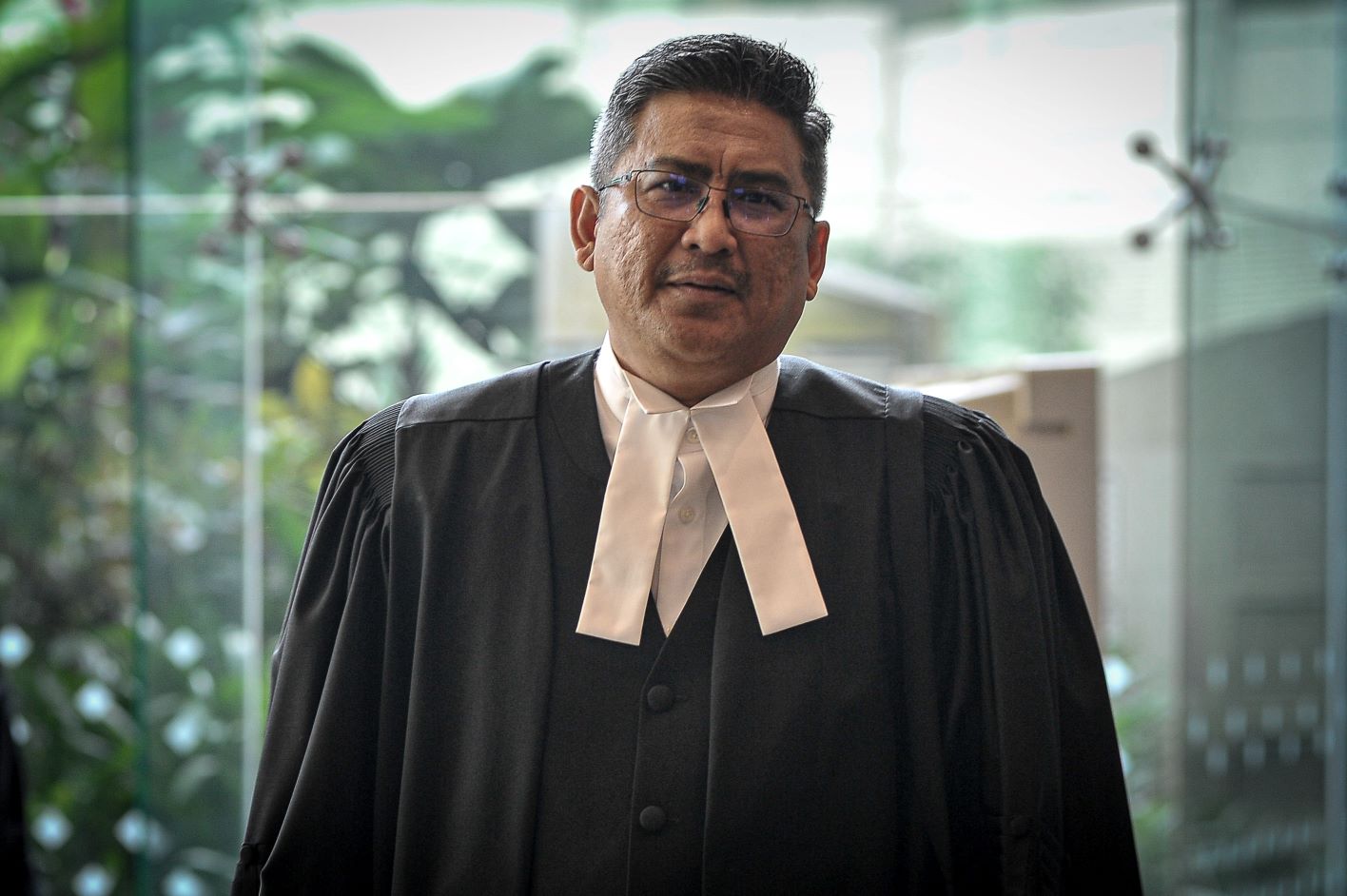
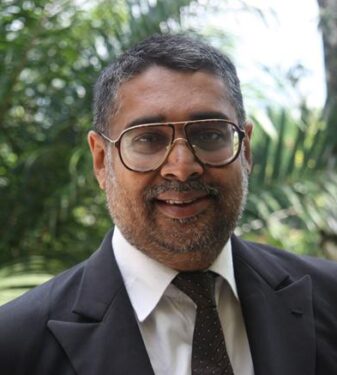




No comments:
Post a Comment